MercoPress. South Atlantic News Agency
Tag: Uruguay economy
-
Saturday, March 16th 2024 - 10:09 UTC
Moody's improves Uruguay's ratings

Uruguay's strong institutions have earned the South American country an upgrade in Moody's rating from Baa2 to Baa1, it was reported Friday. The risk-gauging agency also changed the outlook to stable.
-
Thursday, July 29th 2021 - 07:46 UTC
Uruguay economy forecasted to grow 3,5% in 2021, with inflation above target, Central bank report

The Uruguayan Central bank in its second-quarter Monetary Policy report forecasted a 3,5% expansion for the country's economy, the same as the estimate of the Finance ministry, but anticipated higher inflation because of an increase in public rates and commodities.
-
Wednesday, January 20th 2021 - 01:27 UTC
IMF: Uruguay advances important reforms amid the pandemic
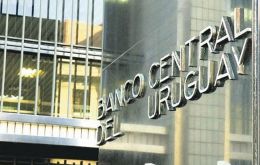
By S. Pelin Berkmen, Dmitry Gershenson, Luis Herrera Prada, and Jose Torres - Despite the ongoing crisis, Uruguay is taking important steps to address preexisting macroeconomic conditions and lay the foundation for a more resilient, competitive, and stable economy.
-
Saturday, July 20th 2019 - 09:50 UTC
Strong contraction of Uruguay's economy: GDP forecasted to grow 0.6% this year
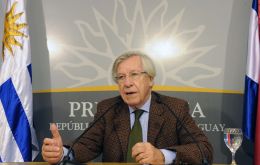
Uruguay's Economy minister admitted on Friday that the country will end 2019 with a “very modest growth”, in the range of 0.6%, but was confident the economy would pick up in 2020 when the construction of a new pulp mill, with an investment of at least two billion dollars, is scheduled to start.
-
Wednesday, June 5th 2019 - 21:00 UTC
Uruguay: Finances don't grow; Economy Minister estimates an improvement for the second semester, as Macri did

Uruguay is experiencing, in recent months, a marked drop in investment and the generation of employment. Uruguayan Economy Minister Danilo Astori admitted Wednesday the fall of public accounts, with an annualized fiscal deficit in April that was 4.8% of GDP, and opted to provide greater incentives to investors and entrepreneurs. The Uruguayan press accuses the government of betting on the hope that the results will begin to be felt in the second half of the year, as it was heard a while ago in Argentina under the administration of President Mauricio Macri.
-
Friday, November 25th 2016 - 08:37 UTC
Uruguay expects 10% increase in international tourist arrivals this summer
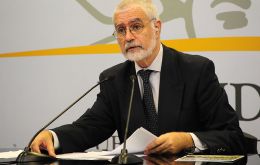
Uruguay's deputy tourism minister said that based on current trends the number of international tourist arrivals during the current summer season, which peaks in December and January, should rise by more than 10%.
-
Friday, December 4th 2015 - 05:33 UTC
Uruguay could be heading to recession because of the government's political stalemate

Uruguay faces seven conditions which are creating a complex scenario and if they are not modified by government, it's most possible the economy is heading for a recession, according to economist Juan Carlos Protasi, a former central bank president.
-
Tuesday, September 29th 2015 - 06:28 UTC
Former president says “no way Uruguay can escape the impact of the Brazilian crisis”
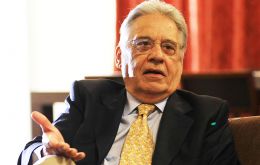
Brazilian former president Fernando Henrique Cardoso, (1995/2002) said that the serious economic situation faced by Brazil is very complex, will take time to overcome and most surely the impact will be felt in neighboring Uruguay, a country which must target other markets, other economic spaces.
-
Thursday, May 7th 2015 - 06:01 UTC
Uruguay's economy 'strong enough' to navigate in challenging environments
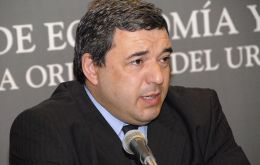
Uruguay's economy is “strong enough to navigate in a challenging global and regional environment” in which the U.S. dollar is strong and inflation is starting to rise, Uruguayan Central Bank, (BCU), chairman Mario Bergara said during a conference in Montevideo where he discussed the central bank's mission in the current world environment.
-
Friday, May 1st 2015 - 06:56 UTC
Uruguay forecast to grow 2.5% this year, but must “strongly moderate” public spending

Private consultants forecast the Uruguayan economy will expand 2.5% in 2015, compared to 3.5% the previous year, but recommend a “strong moderation” in government spending to retake the path of sustained growth and contain the consequences of an adverse international scenario mostly recessive.
